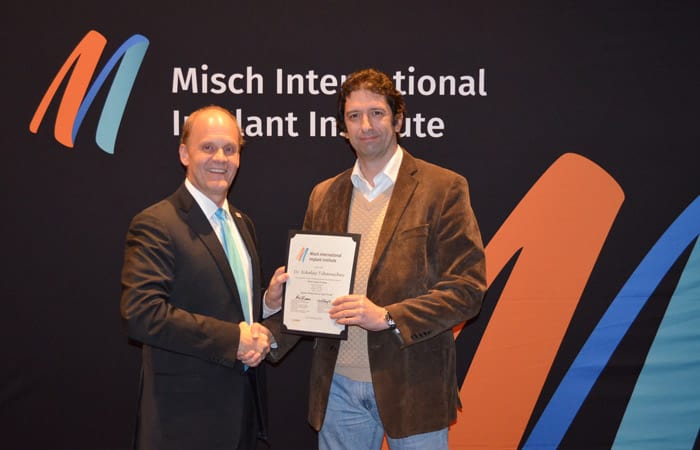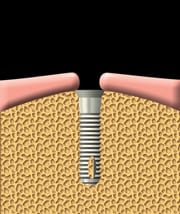Dental Implants
Hello,
Lately I was asked by a patient to explain dental implants and outline the “most important part” of these. I did my best to gather some thoughts (thank you Canadian Dental Association) and present everything on my site. I do not intend to be exact with this information, but just outline the obvious advantages over other options of the dental implant treatment for substituting missing teeth. I am continually increasing my knowledge of the latest techniques and treatments, I have obtained certification at the Misch Institute. If you have any specific questions, I will be glad to personally address these and give you answers to your satisfaction:
We are pleased to announce that Dr. Tchaouchev has graduated from the Misch Implant Institute. The Misch Implant Institute was established in 1984 to help set and elevate the standard of care in implant dentistry using a literature & hands-on based curriculum. Now world renown, the Institute’s unique approach is to provide the most progressive and documented information for its students. The Institute has awarded its graduates with experiences they will use throughout their careers to enhance their patient’s lives.
Dr. Nik Tchaouchev has completed an advanced implant surgical program recognized by the Academy of General Dentistry and the ADA-Cerp.
We congratulate Dr.Nik on his accomplishment and recommend making your appointment with him today!

Dental Implants – Replacing Missing Teeth
If one or more of your teeth are missing, there are ways to replace them! There are three ways, in general, to do so: implants, bridges, and removable dentures. Implants are used to replace missing roots and support artificial replacement teeth. They are comfortable and look like natural teeth.
What Are Dental Implants?
A dental implant is an artificial root made of titanium metal. It is inserted into the jawbone to replace the root of the natural tooth. An artificial replacement tooth is attached to the implant. The implant acts as an anchor to hold the replacement tooth in place.
Who Does This Procedure?
Dr. Nik Tchaouchev has been properly trained to place dental implants by the world-renowned Misch International Implant Institute. The implants most commonly used at Roseland Dental are from BioHorizons, featuring the revolutionary Laser-Lok technology.
Who Can Get Dental Implants?
If you are in good general health, have healthy gums and have enough bone in the jaw to hold an implant, dental implants may be right for you. If your jawbone has shrunk or if it has not developed normally, you may be able to have a bone graft to build up the bone. A bone graft is a way of adding new bone to your jawbone. Your dentist or dental specialist will tell you if bone grafting can be done.
How Dental Implants Are Done
- Your dentist will carefully examine your mouth and take x-rays of your head, jaw and teeth to find out if dental implants are right for you.
- During the first stage of surgery, your dentist will put a dental implant into your jawbone beneath the gum tissue. The gum tissue is then stitched back into place. As the tissue heals, the implant will bond with the bone and attach to the gum. It can take several months to heal (3-6).
- During the second stage of surgery, once the tissue is healed, your dentist will attach an abutment to the implant. An abutment is a post that connects the replacement tooth to the implant. In some cases, the first and second stage of implant surgery may be done in one single stage.
- An artificial replacement tooth is made and your dentist attaches it to the abutment. It may take several appointments to properly fit the replacement tooth to the abutment.
- When replacing several teeth or all of your teeth, a fixed bridge is anchored to your dental implants. A bridge is a dental restoration that replaces one or more missing teeth by spanning an area that has no teeth. The bridge is held firmly in place by dental implants on each side of the missing tooth or teeth.

A dental implant is inserted into the jawbone.

An abutment is attached to the implant. The abutment connects the artificial tooth to the implant.

A fixed bridge is anchored to dental implants to replace one or more teeth.

A fixed bridge is anchored to dental implants to replace all teeth.
Caring For My Dental Implant(s)
Because dental implants are placed in the jawbone, artificial replacement teeth attached to implants look and act much like natural teeth. Like natural teeth, implants need to be kept clean using a toothbrush and floss. Your dentist will show you the proper cleaning procedure for implants. Regular dental checkups are important so your dentist can make sure that your bite is right and that your implants are not loose.
What Else Should I Know?
-
Several visits to your dentist or dental specialist may be needed until the process is done.
-
Checkups will be scheduled so your dentist can be sure your implants are working properly.
-
You will need to take very good care of your implants.
-
Implants can cost more than other kinds of replacement teeth and might not be covered by your dental plan. But in most cases this is a one-time cost, unlike other kinds of tooth replacement procedures.
-
Although rare, possible complications due to dental implants include bleeding, infection, numbness or injury to nearby muscles or the sinus cavity. In some cases, the implant may not be successful because it didn’t bond to the bone.
If you think that dental implants might be right for you, contact us today to request a dental appointment.
“Every tooth in a man’s head is more valuable than a diamond”
― Miguel de Cervantes, Don Quixote, 1605
Our Location
Suite 101
7135 West Saanich Rd,
Brentwood Bay, BC V8M 1P7
FREE Parking!
Office Hours
Mon 11:00 AM – 7:00 PM
Tues and Wed 8:00 AM – 4:00 PM
Thursdays available according to the patient's individual treatment plan and Dr. Nik's discretion
